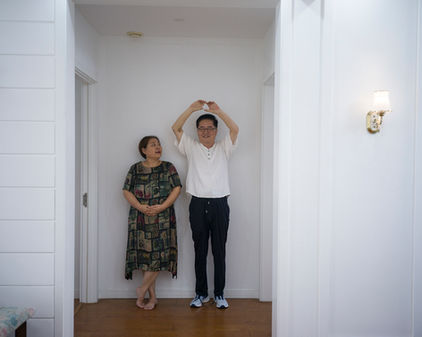I did nothing other than to tell them to smile
Hot soup on the table, cotton clothes, and a television that never turns off―
these are the things that make up a traditional Chinese family.
My father is the youngest of three brothers, and my mother the youngest of five siblings and the only daughter.I was born in 1994, when the Chinese government was promoting the “one-child policy.”Like many families of that generation, I grew up as an only child.
Without any precedents to follow, the three of us had to face a new form of intimacy together.
My parents were married on November 7, 1990, and celebrated their thirtieth wedding anniversary in 2020―what is called the “Pearl Wedding” in China.In today’s society, where long-lasting relationships have become rare, thirty years of marriage is something many people admire.
One day, my parents said to me,“We’ve never taken our wedding photos. Since you study photography, could you take them for us?”That casual remark became the starting point of this work.
Like most family portraits, they smiled before the camera and said “cheese” to the person behind it.Yet sometimes, the shutter didn’t fire at the right moment―their smiles stiffened, their eyes froze mid-blink.Even so, the joy contained within those moments was always genuine.
The three of us worked together as if in a small play, intertwining portraits, domestic spaces, and fragments of everyday life.In those images, intimacy coexists with awkwardness, and a quiet absurdity hovers just beyond the real.
Eventually, I left home.My parents remained where they were, and we continued to look at each other in different ways.The subtle visual dissonance between us quietly erodes the façade of the “traditional happy family.”It is within these gentle cracks of daily life that we are forced to confront what cannot easily be expressed―the contradictions of time, distance, and emotion itself.
ただ笑って、と伝えただけ
テーブルの上の温かいスープ、綿の服、そして永遠に消えることのないテレビ。
それらは、中国の伝統的な家庭を形づくるものだ。
父は三人兄弟の末っ子であり、母は五人兄弟の中で唯一の娘、そして末っ子だった。
私は1994年に生まれた。当時、中国では「一人っ子政策」が推進されており、多くの家庭と同じように、私は一人っ子として育った。前例のない新しいかたちの親密さに、私と両親の三人はともに向き合ってきた。
両親は1990年11月7日に結婚し、2020年に結婚三十周年を迎えた。中国ではそれを「真珠婚」と呼ぶ。現代社会において、三十年を共に歩むことは、多くの人々にとって羨望の的である。
ある日、両親はこう言った。「私たちはまだ結婚写真を撮ったことがない。あなたは写真を学んでいるのだから、撮ってくれない?」その何気ないひと言が、この作品のきっかけとなった。
多くの家族写真と同じように、彼らはカメラの前で笑顔を作り、私に向かって「チーズ」と言う。
しかし、時にはシャッターがうまく切れず、作られた笑顔が固まり、まばたきの途中で止まってしまうこともある。それでも、その一瞬に宿る喜びの感情は、いつも本物だ。
私たち三人は、まるで演劇のように、ポートレート、家庭の空間、日常の断片を交差させながら撮影を行った。そこには親密さと気まずさが共存し、現実をわずかに越えた滑稽さが漂っている。
やがて、私は家を離れた。両親は同じ場所にとどまり、私たちはそれぞれ異なるかたちで互いを見つめ続けている。そのわずかな視覚のずれや不協和が、「伝統的で幸福な家庭」という外殻を静かに崩していく。日常の平穏にひそむその亀裂こそが、私たちが向き合わざるを得ない――時間と距離、そして感情の矛盾そのものなのだ。



















我只是让他们微笑
餐桌上的热汤、厚实的棉衣、永远不会关掉的电视机――这些构成了一个典型的中国式家庭。
父亲是三兄弟中最小的一个,母亲是五个孩子中唯一的女儿,也是最小的一个。我出生于1994年,那时中国正大力推行“独生子女政策”,和许多家庭一样,我是家中唯一的孩子。
成长的过程中,我们三个人在没有任何前例可循的情况下,一起面对一种新的亲密关系。
我的父母于1990年11月7日登记结婚。2019年,他们拍摄了结婚纪念照;2020年迎来了结婚三十周年――在中国,这被称为“珍珠婚”。在当代社会,能维持三十年的婚姻,对于许多人而言是一件令人羡慕的事。
有一天,他们对我说:“我们还从来没有拍过婚纱照。你学摄影,能不能帮我们补拍一张?”这句看似随口的话,成为了创作的起点。像大多数家庭合影那样,他们面对镜头,挤出笑容,对着镜头后的人说“茄子”。然而,有时快门延迟,使笑容僵硬,眼神停滞,甚至留下半眨的瞬间。我们三个像“演剧”一样,将肖像、家庭环境与日常片段交织在一起。在日常感情中又略显尴尬,超越现实的荒诞。
即便如此,凝聚在那一瞬间的喜悦之情始终是真实的。
后来,我离开了家。他们留在了原地,我们之间以不同的方式继续相互凝视。
视觉错位与不协调,打破了庄重的“传统幸福家庭”。这之间的裂缝关乎日常的平静中,如何直面那些难以言说的矛盾。





























